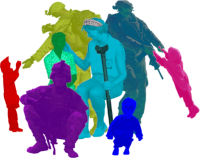In the shadows of our global community, countless children endure the unimaginable horrors of trafficking and slavery. These young souls are not just statistics; they are individuals with dreams, aspirations, and unique needs that must be addressed to help them heal and thrive. Our mission is to bring their stories to light, ensuring that their voices are heard and their needs are met with compassion and understanding.
Understanding the Unique Needs of Child Survivors
Child survivors of trafficking and slavery face a myriad of challenges that require specialized care and attention. Their experiences often leave deep psychological scars, impacting their emotional well-being, physical health, and social development. Addressing these needs is crucial in helping them reclaim their lives and build a brighter future.
Psychological Support
 Many child survivors suffer from trauma-related disorders such as PTSD, anxiety, and depression. Providing access to mental health services, including counseling and therapy, is essential for their recovery. Trauma-informed care approaches can help them process their experiences in a safe environment.
Many child survivors suffer from trauma-related disorders such as PTSD, anxiety, and depression. Providing access to mental health services, including counseling and therapy, is essential for their recovery. Trauma-informed care approaches can help them process their experiences in a safe environment.
Educational Opportunities

Education is a powerful tool for empowerment and reintegration into society. Survivors need access to quality education tailored to their individual learning levels. This includes vocational training programs that equip them with skills for future employment.
Medical Care
 The physical toll of trafficking can be severe, with many children suffering from malnutrition, untreated injuries, or diseases contracted during captivity. Comprehensive medical care is necessary to address these issues and promote overall health.
The physical toll of trafficking can be severe, with many children suffering from malnutrition, untreated injuries, or diseases contracted during captivity. Comprehensive medical care is necessary to address these issues and promote overall health.
Safe Housing
 A stable living environment is critical for healing. Safe houses or foster care arrangements provide the security needed for children to begin rebuilding their lives without fear of re-exploitation.
A stable living environment is critical for healing. Safe houses or foster care arrangements provide the security needed for children to begin rebuilding their lives without fear of re-exploitation.
Legal Assistance
 Navigating legal systems can be daunting for survivors seeking justice or residency status in new countries. Legal aid ensures they have representation to advocate for their rights effectively.
Navigating legal systems can be daunting for survivors seeking justice or residency status in new countries. Legal aid ensures they have representation to advocate for their rights effectively.
Community Reintegration
 Social stigma can hinder reintegration efforts; thus, community-based support networks play a vital role in fostering acceptance and inclusion.
Social stigma can hinder reintegration efforts; thus, community-based support networks play a vital role in fostering acceptance and inclusion.
